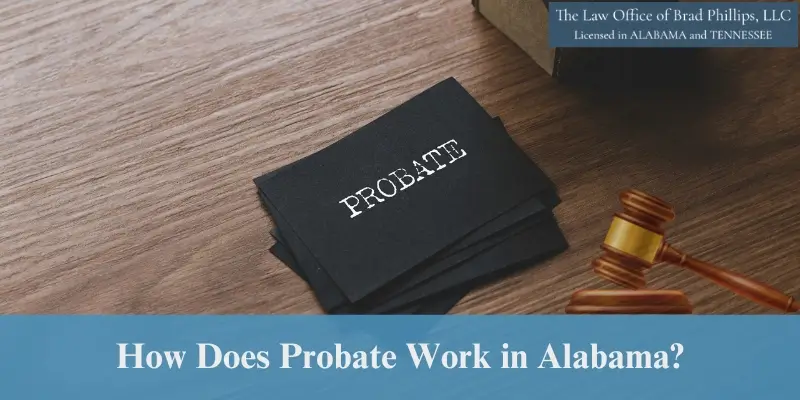|
|
Last Modified on Sep 13, 2025
After someone you love dies, people are often left with many questions and concerns about the necessary legal process. If you are named as the executor, or the title defaults to you, processing the will, or lack thereof, can be a main concern. In this position, you may wonder, “How does probate work in Alabama?” Our team is here to help you understand how the probate process functions.
About Us
The Law Office of Brad Phillips, LLC, has been helping the people of Northern Alabama with their Probate cases for years. Our founder, Brad Phillips, graduated Valedictorian of Birmingham School of Law, later returning to teach and assist the next generation of legal professionals. Our team has the experience and knowledge to make a positive impact on your case.
What Is Probate?
Probate is the legal process by which a deceased’s personal assets are distributed to interested parties and existing debts are paid. It is used for those who either have a will or no other estate arrangements. Since these two demographics account for 83% of the United States population, your loved one’s estate will likely go through probate.
Probate involves the decedent, the executor, and the beneficiaries. The decedent is the one who creates a will, and it is their assets that are in question. The executor is the person in charge of administering the decedent’s estate and executing the decedent’s wishes. If no executor is named, the state defaults to a set hierarchy of relations. Finally, the beneficiaries are any named heirs of parties who will receive something from the decedent.
How Does Probate Work in Alabama?
Probate in Alabama follows a set order of operations that ends with the closing of the estate. The following are the steps to the proceedings:
Initial Petition
Probate starts with the person most likely to be the executor filing a petition to open probate in the county in which the decedent lived. This petition includes a copy of the death certificate, the most up-to-date will, and the names and addresses of all beneficiaries.
Notify Interested Parties
Next, the executor must notify all creditors, beneficiaries, and heirs of the probate and any upcoming court hearings. This is done through formal letters sent through first-class mail to interested parties, as well as a public notice printed once a week for three consecutive weeks in a newspaper in the county where the deceased lived.
Court Decision
After notifications have been made, the court will appoint the executor. In most cases, this will be according to the will or a relative regarding the hierarchy. In some scenarios, an interested party or relative may contest this choice and open the case to litigation.
Inventory and Appraisal of Assets
Once an executor is established, the next step is for them to take inventory and evaluate all property of the decedent. This can be a lengthy, challenging process that may require outside appraisal for accurate values. Assets jointly owned by a spouse or living person are generally excluded from the probate process.
Pay Debts
All debts, taxes, and expenses are paid after the total value of the estate is established. These are paid in the following set order:
- Funeral expenses
- Court and legal fees
- Bills for any ailments of the deceased
- Applicable taxes
- Debts due to employees
- Any other outstanding debts
Distribute Remaining Property & Close Estate
After creditors are paid, the remaining assets are then divided among the beneficiaries. If there are no objections to the terms, the executor files a final settlement. This document reiterates the estate’s inventory, debts paid, and the distribution to beneficiaries. The final settlement is reviewed by the courts, and another hearing will take place where the executor is released from duties and the probate ends.
Hire a Probate Lawyer
Each step of the probate process can come with many issues that can be hard to address on your own. Hire a probate lawyer who can help you with each stage of probate. Your skilled Alabama probate attorney can draft documents, inventory the estate, and represent you in any litigation. Having experienced legal counsel can ease an already difficult situation.
FAQs
How Much Does a Probate Lawyer Cost in Alabama?
How much your Alabama probate lawyer costs depends on the complexity of your case, whether it is contested, and the work hours it requires. A simple estate with few assets that goes uncontested tends to be cheaper than cases involving high-value assets and contestations that require litigation. Another contributing factor is the pricing model, with different firms utilizing hourly rates, retainer expenses, or flat fees for specific services.
Can an Estate Be Settled Without Probate in Alabama?
In Alabama, some estates can be settled without the need for probate. If the deceased had a trust or another estate document, then probate can be avoided. Another instance where probate is not necessary is when the estate is small enough to qualify for summary distribution. Finally, if the decedent jointly owned their property, the surviving partner can assume responsibility for their assets.
What if the Executor Is Unfit for Their Role?
If the executor is unfit for their role in a probate case, any interested party may petition the probate court to have them removed. Common reasons for this include mishandling of funds, conflict of interest, or incompetence. In these situations, a notice is given to all interested parties, and a claim is opened to review the executor’s effectiveness in their position.
How Long Does Probate Take in Alabama?
How long your Alabama probate case takes primarily relies on the size of the estate you are handling and whether there are contesting interested parties. A small estate that is easy to appraise and goes uncontested can take a few months, while a large estate requiring extensive inventory and multiple contesting beneficiaries can take many months or years. Your probate lawyer can provide a rough timeline for your case based on its details.
Speak With an Alabama Probate Attorney Today
At The Law Office of Brad Phillips, LLC, we are prepared to help you through this challenging period.
Contact us today for an initial consultation, where we can answer any questions you may have about probate and begin assisting you through the proceedings. You may also visit our Florence office—located on Bruin Drive, a block off of Helton Drive and Southeast of Cox Creek Park.





